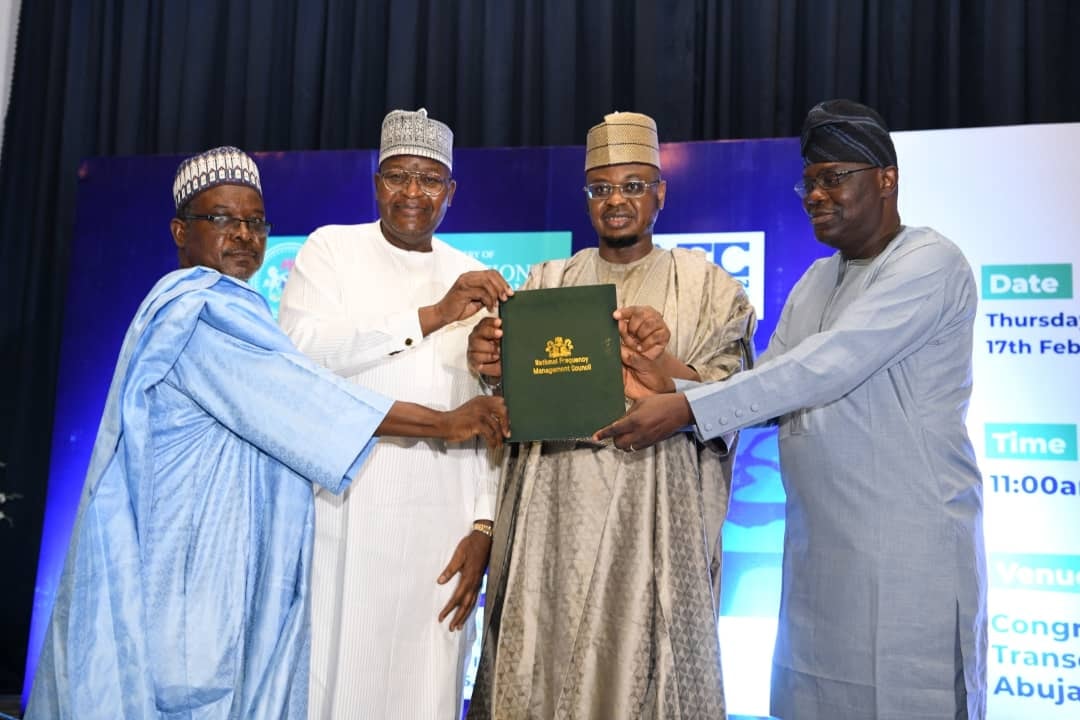Telecom
FG Officially Hands Over 5G Spectrum Allocation to NCC

The Federal Government has officially handed over the spectrum allocation for Fifth Generation (5G) deployment in the country to the Nigerian Communications Commission.

L- R: Engr Abubakar Ladan Abdullahi, Director, National Frequency Council (NFMC); Prof. Umar Garba Danbatta, Executive Vice Chairman, Nigerian Communications Commission (NCC), Prof. Isa Ali Pantami, Minister of Communications and Digital Economy/Chairman, NFMC and Prof. Adeolu Akande, Chairman, NCC Board of Commissioners
This is coming barely a week before the deadline set by the NCC for the payment of the spectrum fees by the winners of the 3.5GHz spectrum auction.
Prof. Isa Ali Ibrahim Pantami, minister of Communications and Digital Economy, who also wears the hat of the Chairman, National Frequency Management Council (NFMC), presented the official document on the 3.5GHz spectrum allocation to the Commission at a public event which took place at the Transcorp Hilton, Abuja on Thursday, February 17, 2022.
The 5G spectrum allocation document was received by the Chairman, NCC Board of Commissioners, Prof. Adeolu Akande, and the Commission’s Executive Vice Chairman/CEO, Prof. Umar Garba Danbatta, on behalf of the Commission.
Speaking at the event, which also witnessed the public presentation of the National Policy on 5G Networks, a document earlier launched by President Muhammadu Buhari on January 25, 2022, the Minister commended the NCC leadership for ‘a transparent, fair and credible 3.5GHz spectrum auction’ conducted on December 13, 2021.
Pantami stated that the NFMC, which he chairs, has the responsibility for managing the allocation of commercial and non-commercial spectrum resources in the country while the NCC is facilitating the deployment of spectrum in the country.
Hence, the Council decided to allocate the assigned spectrum for 5G network to the NCC to enable it assign same to the winners of the 3.5GHz spectrum auction.
Pantami also stated that the 5G network, when deployed, will bring a lot of benefits and opportunities that will engender accelerated growth and smart living in the country.
He asserted that the technology will bring substantial network improvements, including higher connection speed, mobility and capacity, as well as low-latency capabilities.
Earlier in his remarks, Akande appreciated the Minister for his efforts in ensuring that every clog that could hinder successful deployment of 5G services are addressed, thus paving the way for mutual understanding and trust among all stakeholders to ensure that the derivable benefits of the new technology are harnessed timely for the nation’s socio-economic development.
He said the effective implementation of the National Policy on 5G, which the Commission is driving, will help in the actualization of the national targets in the Nigerian National Broadband Plan (NNBP) 2020-2025, the National Digital Economy Policy and Strategy 2020-2030, as well as other sectoral policies designed to enhance Nigeria’s digital culture.
The EVC of NCC, Danbatta, while expressing appreciation to the Minister and all stakeholders for the role played in the emerging 5G network policy implementation initiatives, said the collective efforts of the private sector and government support will make deployment of 5G network transform every aspect of the nation’s economy.
He was optimistic that the expected transformation will be greater than what the nation witnessed with the 1G, 2G, 3G and 4G.
Recalling the diligence that attended the implementation of 5G policy by the NCC since the process started in 2019, Danbatta said Nigeria had taken proactive and meticulous steps to be among the leading players in the global digital economy.
“We have been meticulous all the way in our 5G deployment journey, from trial across selected states in the country, to review and stakeholder engagement, to approval by the Federal Executive Council (FEC), to the 3.5GHz spectrum auction, and up to the official launch of the national policy on 5G network by the President.
“Now we have the official allocation of the spectrum to the NCC for onward assignments to the winners. So, the coast is clear for the country to assign the specific reference in the spectrum to the winners, upon announcement of payments,” Danbatta said.
Meanwhile, eminent stakeholders and dignitaries at the event, have commended Danbatta for ensuring sterling record of transparency and accountability in the sale of the 3.5GHz Spectrum Band allocated for deployment of 5G network in Nigeria.
The stakeholders include the Permanent Secretary, Federal Ministry of Communications and Digital economy, Mr. Bitrus Nabasu; the former Executive Secretary of the Commonwealth Telecommunication Organisation (CTO), Mr. Shola Taylor; Director General, National Information Technology Development Agency (NITDA), Kashifu Abdullahi; Managing Director of Galaxy Backbone Plc, Prof. Muhammed Abubakar; and the Director General of National Identity Management Commission, Dr. Aliyu Aziz, among others.
Earlier in a presentation on the Benefits of 5G, Engr Shola Taylor, a former Secretary of the Commonwealth Telecommunications Organisation, declared that 5G will have far-reaching transformational impact on major sectors of the Nigerian economy, which will bring about rapid social-economic development of the country.
Telecom
MTN Nigeria Crowns Ayo Benzi Winner of Next Afrobeats Star

MTN Nigeria, in collaboration with ONErpm and Ultima Studios, has announced Ayodeji Benson, popularly known as Ayo Benzi, as the winner of the maiden edition of the Next Afrobeats Star reality show.

L-R: Onyinye Ikenna-Emeka, Chief Marketing Officer, MTN Nigeria; Ayodeji Benson, Winner, Next Afrobeats Star Reality Show (Season 1) and Emamoke Ogoro, General Manager, Brand and Communication, MTN Nigeria, at the grand finale of the Next Afrobeats Star Reality Show (Season 1), held at the Ultima Studios, Lekki, Lagos on Saturday, December 13, 2025.
The grand finale, held on Sunday night at Ultima Studios in Lekki, Lagos, marked the climax of a nationwide talent search that began in September with over 15,000 aspiring musicians.
After weeks of auditions, mentorship, and rigorous training, five finalists – Ayo Benzi, Dave Cash, Kaeko, Somto O’Laker, and Lucky Yay – battled for the top prize in a high-energy showcase of performance and artistry.
At the end of the electrifying contest, Ayo Benzi emerged victorious, securing a ₦150 million music deal. Dave Cash was named first runner-up with ₦100 million, while Kaeko, Somto O’Laker, and Lucky Yay received ₦75 million, ₦50 million, and ₦25 million respectively.
Throughout the season, contestants were mentored by leading Afrobeats producers Sarz, Puffy Tee, P Prime, and Andre Vibez. Benzi, who was part of Puffy Tee’s team, credited the mentorship programme for sharpening his craft and stage presence.
Speaking at the event, Onyinye Ikenna-Emeka, Chief Marketing Officer of MTN Nigeria, said the initiative reflects the company’s commitment to youth empowerment and cultural expression.
“The Next Afrobeats Star platform is about creating real opportunities for young Nigerians and giving their talent the structure, visibility, and support it deserves.
“Afrobeats continues to place Nigeria on the global cultural map, and MTN is proud to be enabling the next generation of artists who will take this sound even further,” she said.
She added that the finale was not just a competition but a celebration of growth and readiness for the global stage.
In his acceptance speech, Ayo Benzi described the victory as a defining moment in his career.
“A big thank you to MTN. From the audition days, the treatment MTN has given us has been amazing. God bless the brand,” he said.
The finale also featured guest performances by Afrobeats stars Iyanya and Bella Shmurda, adding glamour to the night and reinforcing the show’s connection to the wider music ecosystem.
With the successful conclusion of the season, MTN Nigeria and its partners reaffirmed their role in championing youth ambition, supporting creative industries, and shaping the future of Nigerian music through platforms that turn potential into opportunity.
Telecom
T2 Faces NCC Probe in Benue Over Major Service Outage in 9 LGAs

T2, formerly known as 9mobile, is under investigation by the Nigerian Communications Commission (NCC) in Benue State for an undisclosed incident disrupting USSD, SMS, voice, and data services across nine local government areas.

T2
The affected areas include Ado, Agatu, Gwer East, Gwer West, Konshisha, Obi, Ohimini, Okpokwu, and Otukpo, as detailed in an advisory on the NCC Major Outages Portal, which tracks significant disruptions reported by Mobile Network Operators (MNOs) and Internet Service Providers (ISPs).
Neither T2 nor its public relations firm, Chain Reactions, has responded to inquiries on the outage’s cause or restoration efforts as of this report.
The NCC’s continued reference to the operator as 9mobile, months after its public rebranding to T2 in August 2025, has sparked questions about whether the name change was formally notified to the regulator.
This probe aligns with NCC mandates requiring operators to disclose major outages, their impacts, and timelines for fixes, with compensation obligatory for disruptions exceeding 24 hours under the Consumer Code of Practice Regulations.
Industry watchers note that such incidents, often linked to fibre cuts, power failures, or infrastructure faults, underscore ongoing challenges in Nigeria’s telecoms sector, particularly amid T2’s subscriber losses post-rebrand. NCC vows transparency via its portal to hold operators accountable and protect consumers.
Telecom
NCC Unveils Draft 5-Year Spectrum Roadmap, 60 GHz License-Exempt Guidelines to Boost Broadband, Innovation

Nigerian Communications Commission (NCC) has unveiled two pivotal regulatory draft documents aimed at reshaping Nigeria’s communications sector over the next five years and fast-tracking deployment of ultra-high-speed wireless technologies.

NCC
In a public notice dated December 19, 2025, and issued pursuant to its mandate under the Nigerian Communications Act (NCA) 2003, the Commission published the Draft 5-Year Spectrum Roadmap for the Communications Sector (2025–2030) and Draft Guidelines for the Use of the 60 GHz License-Exempt Band for Multi-Gigabit Wireless Systems.
Both documents are accessible on the NCC website for stakeholder review, with the roadmap outlining strategic spectrum planning, allocation, and management to optimise utilisation, support emerging technologies like 5G and IoT, expand broadband access, and align with global best practices.
The Spectrum Roadmap emphasises four core pillars: bridging the digital divide through low-band spectrum and satellite services, attracting investments via flexible licensing models, enhancing service quality with mid-band optimisation, and fostering innovation in areas such as direct-to-device connectivity and secondary spectrum trading.
It sets ambitious targets including universal 4G coverage nationwide, 50 per cent 5G penetration in state capitals, and average broadband speeds of 100 Mbps by 2030, while addressing rising data demand through band refarming and efficient management.
Complementing this, the 60 GHz Guidelines establish a license-exempt framework for the 57–66 GHz band, enabling multi-gigabit speeds up to 10 Gbps for short-range applications like WiGig, fixed wireless access, enterprise connectivity, urban broadband, and backhaul solutions.
The rules mandate NCC type approval for equipment, site registration for outdoor use, and interference mitigation measures, while prohibiting wide-area networks to safeguard primary users.
In line with Section 58 of the NCA 2003, NCC invites comments from industry operators, equipment manufacturers, consumer groups, and the public, with submissions due by Friday, January 16, 2025, via email to [email protected], [email protected], and [email protected].
The notice, signed by Mrs Nnenna Ukoha, Head of Public Affairs, stresses that stakeholder inputs will refine the frameworks to drive innovation, investment, competition, and sustainable growth in Nigeria’s telecoms ecosystem.

 Telecom3 days ago
Telecom3 days agoT2 Faces NCC Probe in Benue Over Major Service Outage in 9 LGAs

 Telecom3 days ago
Telecom3 days agoMTN Nigeria Crowns Ayo Benzi Winner of Next Afrobeats Star

 E-Business3 days ago
E-Business3 days agoJumia CEO says Black Friday Signals Nigeria’s E-Commerce Maturity

 E-Financial3 days ago
E-Financial3 days agoGTCO Secures Regulatory Approvals to Raise N10bn in Private Placement

 General News3 days ago
General News3 days agoNDIC Reinforces Full Oversight Compliance to Safeguard Depositors

 E-Financial2 days ago
E-Financial2 days agoBanks to Impose N50 Stamp Duty on Transfers of N10,000 and Above from January 1

 E-Financial2 days ago
E-Financial2 days agoHow Nigeria’s New Tax Law Could Redefine Risk in the Banking Sector

 Telecom3 days ago
Telecom3 days agoNCC Unveils Draft 5-Year Spectrum Roadmap, 60 GHz License-Exempt Guidelines to Boost Broadband, Innovation























